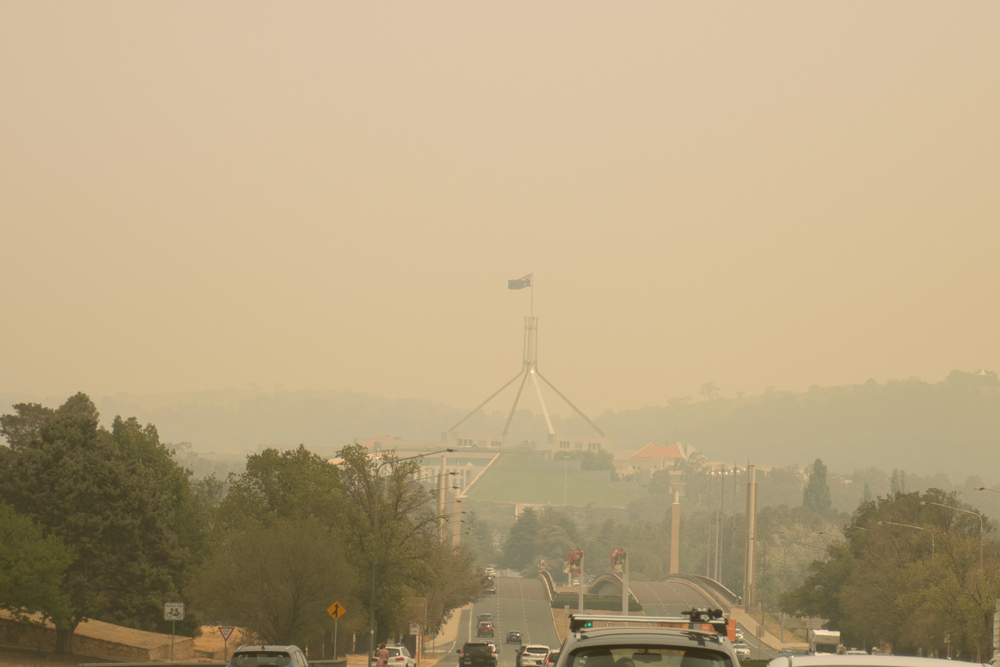Wood heater smoke in the Australian Capital Territory is estimated to cause similar mortality to the extreme smoke of the Black Summer Bushfires of 2019–20, new research has found.
The alarm has been sounded about the dangers of wood heater smoke, with new research showing just how deadly exposure to the smoke is in the Australian Capital Territory (ACT).
The research, published today in the Medical Journal of Australia, states that domestic wood heaters are the predominant source of particulate air pollution in the ACT and across many areas of the southern states, producing fine particles (PM2.5), carbon dioxide, methane and black carbon.
The health impact of wood heater smoke is significant, causing premature death and exacerbation of asthma and other respiratory and cardiovascular conditions.

“As bad as the Black Summer bushfires”
The researchers undertook a rapid health impact assessment of the effect of wood heater pollution on mortality in the ACT, using air quality data from three monitoring stations and existing population health statistics.
They estimated that wood heaters accounted for 13–25% of fine particulate matter air pollution in the ACT during the five years assessed in their research.
This resulted in 11–63 premature deaths each year, with more deaths recorded in years with colder weather.
“The estimated annual number of deaths in the ACT attributable to wood heater [fine particulate matter (PM2.5)] pollution is similar to that attributed to the extreme smoke of the 2019–20 Black Summer bushfires,” Professor Sotiris Vardoulakis and colleagues wrote.
“The consequence of current wood heater use in the ACT is 11–63 avoidable deaths, equivalent to $57–333 million in the annual cost of deaths, comparable with the 31 deaths in the ACT attributable to the bushfire smoke during the Black Summer of 2019–20.”
The researchers noted that the health impacts from wood heaters is probably greater than these estimates, as other health consequences such as hospitalisations, general practitioner visits and deterioration of other health conditions, such as asthma, were not included in their study.
Professor Vardoulakis is inaugural Professor of Global Environmental Health and Director of the Healthy Environments And Lives (HEAL) National Research Network at the Australian National University.
Professor Vardoulakis and colleagues were prompted to undertake their research, following the release of the 2021 ACT Bushfire Smoke and Air Quality Strategyby the ACT Government.
The government report recognised wood heaters as a major source of air pollution but did not estimate the number of deaths or the associated costs.
Wood heater smoke “negatively affecting Canberrans”
Smoke that comes from household wood heaters is a significant source of Canberra’s air pollution in winter months, the ACT’s Office for the Commissioner for Sustainability and the Environment said.
“This situation is particularly concerning, as there is no safe concentration of fine particle pollution for sensitive people, and smoke can cause serious respiratory and cardiovascular outcomes at the population level,” it stated.
“Over the period of 2017–2019, air pollution complaints to the EPA were dominated by smoke (wood heaters and controlled burns), accounting for 403 air pollution complaints (55 per cent of the total).
“While there has been increasing recognition of the negative impacts of wood heaters and smoke, there has been a lack of clear progress in improving air pollution in Canberra over time.”
The ACT Government announced in August 2023 that it would phase out wood heaters by 2045, with a ban on the installation of new wood heaters in some suburbs extended.
“The government will now begin work on a plan for phasing out wood heaters in all suburbs (excluding rural areas) in line with our ‘pathway to electrification’, to transition away from fossil fuel gas by 2045,” the ACT Minister for the Environment, Rebecca Vassarotti, said.
“Part of the plan will be considering appropriate support for the community to ensure this phase-out of wood heaters is part of a just transition approach to electrifying our city.
“We are aware that high costs of living are placing financial stress on many and the government will incorporate this consideration into our next steps to ensure we can best support the community in the phase-out process.”
“Positive development” but more action needed
“The ACT Government’s recent announcement of phasing out wood heaters in the Australian Capital Territory by 2045 is a positive development,” Professor Vardoulakis told InSight+.
“Similar steps including not permitting the installation of new wood heaters and phasing out existing ones in residential areas of other jurisdictions can offer major health and environmental benefits in Australia.
“Other effective measures include financial incentives or rebates to lower-income families to encourage people to replace wood heaters with cleaner alternatives that produce lower emissions, such as reverse cycle air conditioning systems powered by renewable energy.”
Read the research in the Medical Journal of Australia.
Subscribe to the free InSight+ weekly newsletter here. It is available to all readers, not just registered medical practitioners.

 more_vert
more_vert